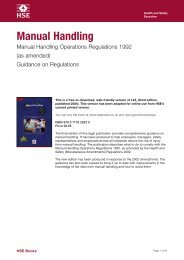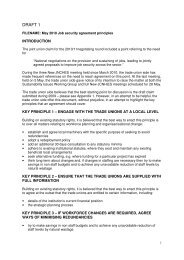Making Companies Safe - what works? (CCA ... - Unite the Union
Making Companies Safe - what works? (CCA ... - Unite the Union
Making Companies Safe - what works? (CCA ... - Unite the Union
You also want an ePaper? Increase the reach of your titles
YUMPU automatically turns print PDFs into web optimized ePapers that Google loves.
self-regulation through <strong>the</strong> adoption of codes of conduct or ‘corporate social responsibility’<br />
initiatives 13 – is largely ineffective in bringing about improved standards of health, safety or<br />
environmental performance. For instance, in a wide-ranging review of <strong>the</strong> regulation of<br />
workplace safety in 1999, Gunningham and Johnstone find “significant evidence of <strong>the</strong> limits<br />
of voluntarism”. 14 In particular, one major study on environmental protection from <strong>the</strong><br />
Ne<strong>the</strong>rlands found that companies were not motivated to introduce safety management<br />
systems until legislation had been put in place. Wright observes in relation to <strong>the</strong>se findings that,<br />
“<strong>the</strong>re is a cost-benefit argument that legislation is needed to encourage<br />
systematic management and that more broadly… <strong>the</strong>re is evidence of<br />
mandatory requirements being effective”. 15<br />
Recent research by <strong>the</strong> OECD on <strong>the</strong> effectiveness of voluntary approaches for environmental<br />
policy concluded that <strong>the</strong> environmental effectiveness of voluntary approaches is often<br />
questionable, and that <strong>the</strong>ir economic efficiency is generally low. The researchers found that<br />
it was highly unlikely that most of <strong>the</strong> voluntary approaches contributed much to emission<br />
reductions and that achievements often did not exceed a ‘business as usual’ scenario, except<br />
in those cases where ‘credible threats’ were incorporated into <strong>the</strong> approach if targets were<br />
not met. The researchers also found that combining voluntary approaches with o<strong>the</strong>r types of<br />
instruments (for example, permitting systems, subsidies, related taxes and charges and<br />
emission trading systems) tended to weaken <strong>the</strong> effectiveness of <strong>the</strong> latter instruments. In<br />
o<strong>the</strong>r words, where participation in emissions trading systems, for example, was voluntary<br />
many businesses chose not to ‘opt-in’ to <strong>the</strong> schemes. 16<br />
Fur<strong>the</strong>r support for <strong>the</strong> importance of law and regulation in bringing about real changes in<br />
corporate behaviour comes from <strong>the</strong> experience and research of NGOs, labour rights activists<br />
and trade unions. NGOs were instrumental in getting multinational companies to adopt<br />
voluntary workplace codes of conduct. However, many human rights NGOs are increasingly<br />
realising <strong>the</strong> limitations of both voluntary codes of conduct and ‘corporate social<br />
responsibility’ initiatives in national and international contexts.<br />
A number of case studies have shown that Corporate Social Responsibility (CSR) programmes<br />
adopted by multi-national and transnational corporations have not brought any tangible<br />
benefits to <strong>the</strong> workers and communities adversely affected by <strong>the</strong>ir operations. 17 Similarly,<br />
<strong>the</strong> experience of workers in developing countries is that many companies are simply failing<br />
to properly implement <strong>the</strong>ir codes of conduct within individual workplaces, and that workers<br />
are wholly unable to protect <strong>the</strong>ir rights in <strong>the</strong> absence of <strong>the</strong> possibility ei<strong>the</strong>r of legal/ state<br />
enforcement or of trade union enforcement and organising structures. 18 Thus, one observer<br />
has commented:<br />
“We have put too much emphasis on codes and probably too much emphasis on<br />
voluntary enforcement. It is untenable to expect companies to enforce <strong>the</strong>ir<br />
codes voluntarily.” 19<br />
As a consequence of <strong>the</strong>se failures, and as observed in a recent letter to Patricia Hewitt signed<br />
by more than 20 leading charities in <strong>the</strong> UK:<br />
“CSR is coming under growing attack from different quarters on <strong>the</strong> basis that it<br />
is not delivering results. Recent reports from think tanks and civil society<br />
organisations call into question <strong>the</strong> effectiveness of existing initiatives”. 20<br />
20<br />
One example of this is research published in March 2004 by <strong>the</strong> consultancy Article 13. It said<br />
that less than 3 per cent of FTSE 350 firms have acted seriously on challenges such as climate<br />
change, waste and poverty. 21 Ano<strong>the</strong>r example is <strong>the</strong> chemical industry’s ‘Responsible Care’<br />
program - a voluntary self-regulatory program set up by <strong>the</strong> industry in response to a loss of<br />
public confidence in <strong>the</strong> US chemicals sector. The stated aim of <strong>the</strong> program is to: “reduce<br />
chemical accidents and pollution, [and] to build public confidence through improved<br />
performance, continuous improvement and increased communication.” 22 However, research<br />
in <strong>the</strong> early 1990s demonstrated that firms which relied on Responsible Care alone did not<br />
achieve better environmental performance. 23 And more recently, research in <strong>the</strong> US has<br />
shown that <strong>the</strong> number of chemical ‘accidents’ each year (including worker fatalities and
















